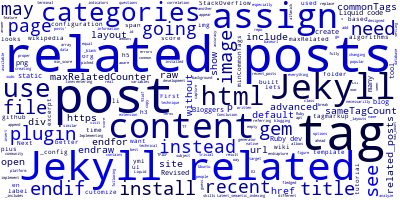Revised Jekyll related posts

Bloggers who have development skills use tools like Jekyll as a blogging platform instead of many other popular options especially designed for people without technical background .
Jekyll is a static site generator and blog aware tool written in Ruby which allows to create fully fledged blogs without the need for a database to store the content because everything from configuration files to content files are static files .
Jekyll related posts can only show recent posts (related in time ) who may not necessarilly be related in terms of subject so the name needs to be page.recentposts instead of page.relatedposts .
In this post we are going to see how we can implement a real related posts feature which looks at different post indicators such as that categories and tags to figure out similar and related posts .
We are going also to see available Jekyll plugin(s) built by the community which use advanced algorithms such as TFIDF and LSI . to further analyze the post content to guess related posts instead of the trivial categories and tags .
Implementing Jekyll related posts based on tags and/or categories
First you need to assign proper tags (or categories or both ) to your posts to use this technique for related posts .
For tags ,this was picked up from this StackOverflow answer
Under your _includes folder create a related-posts.html file and copy the following Liquid code
{% assign maxRelated = 5 %}
{% assign minCommonTags = 3 %}
{% assign maxRelatedCounter = 0 %}
{% for post in site.posts %}
{% assign sameTagCount = 0 %}
{% assign commonTags = '' %}
{% for tag in post.tags %}
{% if post.url != page.url %}
{% if page.tags contains tag %}
{% assign sameTagCount = sameTagCount | plus: 1 %}
{% capture tagmarkup %} <span class="label label-default">{{ tag }}</span> {% endcapture %}
{% assign commonTags = commonTags | append: tagmarkup %}
{% endif %}
{% endif %}
{% endfor %}
{% if sameTagCount >= minCommonTags %}
<div>
<h5><a href="{{ site.baseurl }}{{ post.url }}">{{ post.title }}{{ commonTags }}</a></h5>
</div>
{% assign maxRelatedCounter = maxRelatedCounter | plus: 1 %}
{% if maxRelatedCounter >= maxRelated %}
{% break %}
{% endif %}
{% endif %}
{% endfor %}
Then to include it in any post :
{% include related-posts.html %}
You can do the same with categories by just changing the few lines referring to tags and replace them with categories .
As you may see to Liquid code looks for most recent posts that have common tags (and categories if you need ) which may not be the best result you want so lets see another way which use content correlation algorithms .
Advanced Jekyll related posts
We are going to use a Jekyll plugin that can be installed from gem .
First of all ,since the plugin is a native extension we need to install Ruby dev files so gem can built it without errors .
So go ahead and open your terminal and install Ruby dev files .
For Ubuntu ,you can install them with :
sudo apt-get install ruby-dev
Next lets install the gem by entering
gem install jekyll-related-posts
Next open _config.yml and add 'jekyll-related-posts' to gems array .
Now open your post layout (_layouts/post.html ) and insert
<related-posts />
Where you want your related posts to appear .
You can further cutomize the plugin by setting configuration variables in _config.yml
related:
max_count: 5
min_score: 0.1
accuracy: 0.75
And you can also cutomize the related posts template by creating related.html template under layouts folder .Here the default content of related.html
{% if related_posts != empty %}
<div id="related-posts">
<h3>Related posts</h3>
<ul>
{% for p in related_posts %}
<li>
<a href="{{ p.url }}" data-score="{{ p.score }}">{{ p.title }}</a>
</li>
{% endfor %}
</ul>
</div>
{% endif %}
For more information about the plugin visit its Github repo
Conclusion
So as we have seen ,The default Jekyll related posts use a time basis to tell if posts are related ,which is in reality recent posts ,that may not be the required behavior desired by many bloggers ,instead we have used a Liquid code to check for tags to show most recent and related posts and for advanced related posts based on analyzing the posts content we have used a Jekyll plugin installable for GEM .
- Author: Ahmed Bouchefra Follow @ahmedbouchefra
-
Date:

